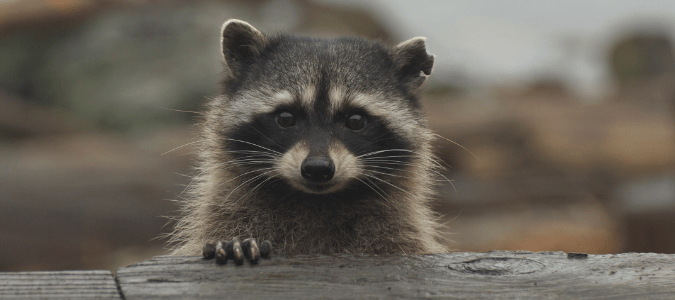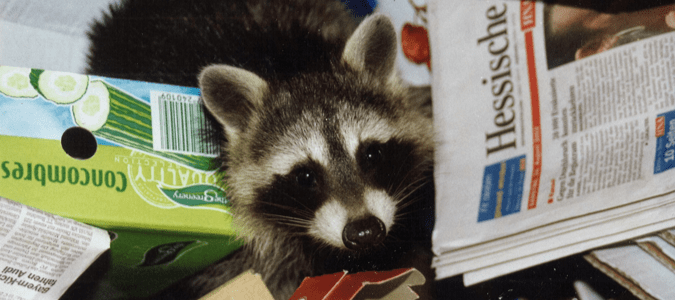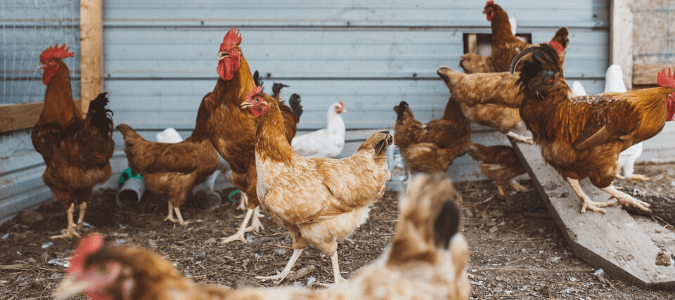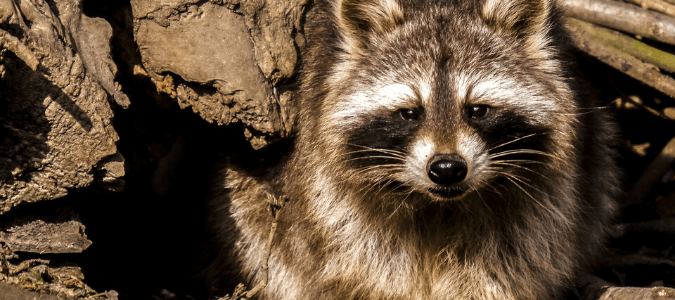How To Get Rid Of Raccoons Under Your Deck

We’ll discuss each of these techniques in a bit more detail.
Keep The Lights On
Raccoons are nocturnal. By shining a bright light by a nesting area, raccoons will sense that it is now an unsafe place for them to live. You can use either an outdoor spotlight or a mechanic’s light, but make sure that whatever light you decide to use is fire-safe. Shine this bright light by the den’s entrance for best results.
Introduce Loud Noises
Grab an old radio and place it near the entrance of the area you’ve spotted a raccoon in the past. Instead of putting on music, tune in to a station with a talk show. Raccoons don’t care much about the sound of music, but human voices are perceived as threatening. Turn up the volume as loud as you can without annoying your next-door neighbors.
Try Unpleasant Smells
It’s only natural for any living creature to want to avoid bad smells. Grab some of your old rags and soak them in either apple cider vinegar or ammonia. If you have a dog or cat who likes to wander around outside, use apple cider vinegar rather than ammonia as this solution can irritate an animal’s respiratory systems. Put the soaked rags in plastic baggies and poke holes in them to let more of the smell out. Either hang the bags up or lay them down by the entrance of the den. You can also experiment with used cat litter, as a raccoon may be threatened by the odor.
Remove Food And Water Sources
Like all other types of common household pests, raccoons are attracted by food and shelter. You can make your property less attractive to these unwelcome guests by feeding pets only in the morning, being diligent about cleaning up leftovers and emptying pet water bowls at night. You may also consider bringing in your bird feeders when it gets dark or putting them on tall poles or far away from nearby trees. Keep trash and recycling in tightly sealed containers to prevent these animals from feeding on any food waste.
One of the reasons that these animals can be so control without the help of a professional is that they will eat practically anything. A raccoon’s diet may include:
- Frogs
- Mice and rats
- Insects
- Snails
- Fish
- Birds
- Nuts
- Eggs
- Fruits
- Vegetables
- Dog or cat food
Raccoons are opportunistic eaters, so if they are given the choice of starving or eating trash, they’ll pick the latter. When attempting to get rid of raccoons yourself, you should know that you will probably need to use all four methods of deterring raccoons consistently in order to be successful. Only implementing one or two measures is not likely to be effective.
While some homeowners might see a raccoon, there are other signs you can look out for that may indicate that a raccoon is in or around your home. Keep reading to learn more about these creatures, including how to protect your chickens and how to tell if the raccoon on your property has rabies. We’ll start by providing you with tips to help determine whether it is a raccoon on your property or even in your home.

Signs Of A Raccoon In The House
Without actually seeing a raccoon, there are other ways to determine whether you have a raccoon living on your property. Some of the most common signs of a raccoon living in or around your house include:
- A strong smell of feces or urine
- Damage to your home, including shutters, shingles, vents or scratches on the outside of your home (holes in wood are more likely to be signs of termites in your yard
- Strange noises in your walls, attic or crawl spaces, especially at night
- Raccoon feces around your property
- Small, hand-shaped tracks
- Trash cans that have been upended or trash that has been scattered around the yard
- Damaged gardens, bird nests or other crops
- Killed chickens or poultry
Keep in mind that some of these signs could also point to opossum activity, so you may want to call in a pest control professional to help confirm which pest is active near your home.
Unfortunately for homeowners with backyard chickens, it is not uncommon to wake up to find that a raccoon has eaten your chickens or eggs. Whether or not you have a raccoon problem, it may be wise to set up measures to prevent raccoons from having easy access to your chickens.

How To Keep Raccoons Away From Chickens
To keep raccoons away from your chickens, you’ll want to adopt the same philosophy we have already mentioned: make your home as unattractive to these animals as possible. Follow the steps we laid out above, including leaving a stereo on, placing foul-smelling cloths around your property and eliminating as many food sources as possible. To protect your chickens with a raccoon or raccoons living on your property, you’ll need to raccoon-proof your coop. Depending on the location of your coop and the extent of your problem, these solutions can range from relatively simple to much more time and resource-intensive.
Lock Your Coop
Since raccoons have been known to untie knots, unscrew jars and open doors, buy a padlock or combination lock to secure the coop. Alternatively, you can use a lock that has more than two steps involved, since a raccoon will not be able to manage a combination lock.
Use Hardware Cloth
As its name suggests, chicken wire is only useful for keeping chickens inside. Don’t assume that this material will keep other types of wildlife out. Use hardware cloth around your coop and chicken run. Dig a trench so that the wire goes two to four feet underground to prevent raccoons from trying to dig it up. Also, raccoons are excellent climbers, so make sure to cover the roof of the coop as well. When hanging up hardware cloth, make sure to use large screws to keep it in place, because raccoons can easily rip out staples.
Place Concrete Slabs Around Your Coop
As an added level of protection from digging, you can place concrete blocks or sandbags around the perimeter of your chicken coop. These will be too heavy for a raccoon to try to move and will stop these animals from trying to dig underneath the coop to reach your chickens.
It’s important to take action if you suspect raccoons are on your property, as these animals are surprisingly nimble and often attack chickens in a violent manner. A raccoon will reach between the chicken wire, grab a chicken and bite it at the neck. Raccoons have been known to try to get as much of the chicken out of the coop as possible, leaving some homeowners to wake up toa disturbing scene.
Raccoons are strong enough to bend chicken wire and can easily reach into the coop and grab your chickens if this is their only option. Also, while some homeowners believe that a dog can protect their chickens, they may find that their resident raccoons are rather bold and aren’t threatened by a pet. This assumption could put your dog in danger, as raccoons are capable of spreading many different diseases to other animals.
Raccoons aren’t just bothersome to have around, or a threat to your pets, unfortunately.

Are Raccoons Dangerous To Humans?
Even if you don’t own chickens, it’s a good idea to get rid of any raccoons that are living on your property, because raccoons can pose a health risk to humans and our pets. These animals can transmit many different diseases, introduce other smaller pests onto your property and even become aggressive if they see you as a threat.
Some of the diseases that raccoons can transmit to us and our pets include rabies, leptospirosis, raccoon roundworm, salmonella, E. coli and giardia. While some of these diseases are transmitted to us through the saliva of a raccoon and are often contracted after getting bitten, many of these conditions are spread by feces and urine. Raccoons defecate in communal areas, and raccoon latrines are often found along the base of trees, on decks or patios, in attics and inside garages. If you have spotted a raccoon latrine, clean the area promptly and with great caution. Always wear gloves and use heat treatments to properly kill raccoon roundworm eggs on any area that was in contact with the feces.
Because raccoons are wild animals, they aren’t treated with flea and tick control medicines as our pets might be. Because of their nomadic behavior, raccoons are more likely to pick up these parasites. It’s not uncommon for a household with no pets to end up with a flea infestation because raccoons have brought these other pests onto their property. And, unfortunately, if you found a flea and you’ve asked yourself: Does one flea mean an infestation?, you probably already have a problem.
In some cases, there’s the danger of a raccoon seeing you or your pet as a threat. While raccoons aren’t known for chasing after humans or pets, if you accidentally stumble across a raccoon, it may use its sharp claws and teeth to attack you. If you suspect you have raccoons, avoid leaving any of your pets outdoors unattended and keep them inside at night.
One of the biggest concerns among homeowners is having a rabid raccoon on their property.

How To Tell If A Raccoon Is Rabid
The first thing to know is that a raccoon out during the day is not necessarily rabid. Raccoons will occasionally forage for food during daylight hours if they have new babies or if they are searching for a new nesting area. Raccoons that are rabid tend to display one or more of the following characteristics:
- A sick appearance
- Foaming at the mouth
- Making strange noises
- Looking disoriented or confused
- Having difficulty walking or staggering around
- Being oblivious to nearby sounds or movement
- Wet and matted hair on its face
- Discharge from eyes, mouth or both
- Wandering around your property or not going in any particular direction
Raccoons are intelligent creatures. If they are on your property, they will move with purpose. Any raccoon that doesn’t appear to be determined to get wherever it’s going may be sick—either with rabies or something else. Whether it is are sick or not, you never want to confront a raccoon, so make sure you don’t let any pets or children outside if there is a raccoon wandering around.
As previously mentioned, a raccoon out during the day usually means one of three things: it is looking for a new place to nest, it has babies or it is sick. In any of these scenarios, a wildlife control specialist can advise you on the best next steps.
Chem-Free Can Handle Your Wildlife Problems
Trying to deal with raccoons on your property can be dangerous and difficult. To make matters more complicated, raccoons are considered a fur-bearing animal in the state of Texas, which means that there are regulations in place regarding trapping and removing these creatures. The wildlife control specialists at Chem-Free Organic Pest Control will be able to locate raccoon nesting grounds and remove these animals from your property. We will then recommend preventative measures to keep these creatures off your property in the future.
Need Help Managing Pests?
Chem-Free offers both effective, low-impact pest control options and preventative measures to help avoid future infestations. Contact us today for a free estimate!


